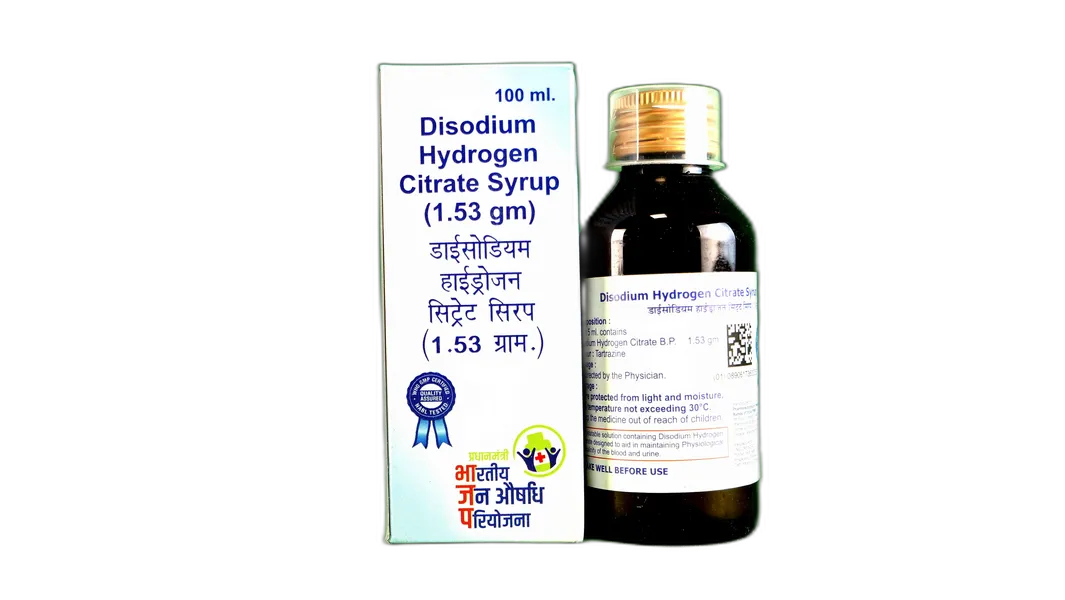◉1. Dosage: The recommended dosage of disodium citrate syrup is typically based on the patient’s age and weight, so it’s essential to follow the healthcare provider’s or pharmacist’s instructions
2. Shake well: Before using the syrup, shake the bottle well to ensure proper mixing of the medication
3. Measuring device: Use the provided measuring device (usually a medicine cup or oral syringe) to measure the correct dose. Do not estimate the dosage
4. Administration: Administer the syrup orally, which means it should be taken by mouth
5. Dilution: In some cases, the syrup may need to be diluted with water or another suitable liquid before administration. Always follow the instructions regarding dilution if applicable
6. Timing: Take the medication as directed by your healthcare provider. It may be taken with or without food, depending on the specific instructions
7. Frequency: Follow the recommended dosing schedule carefully. This may vary from once a day to multiple times a day, depending on the condition being treated
8. Duration: Continue taking the syrup for the full course of treatment, even if you start to feel better. Do not stop without consulting your healthcare provider
9. Missed Dose: If you miss a dose, take it as soon as you remember. However, if it’s close to the next scheduled dose, skip the missed one and continue with your regular dosing schedule
10. Storage: Store the syrup at the specified temperature and away from direct sunlight or heat sources, as mentioned on the label
11. Special Instructions: Some medications or medical conditions may require additional specific instructions, such as taking the medication at a certain time of day or avoiding certain foods or beverages. Follow any such instructions closely
12. Side Effects: Be aware of potential side effects, and if you experience any adverse reactions, contact your healthcare provider promptly
13. Allergies: Inform your healthcare provider of any known allergies or adverse reactions to medications before starting this syrup
14. Other Medications: Be sure to inform your healthcare provider or pharmacist about any other medications or supplements you are taking to avoid potential drug interactions
Always follow the specific instructions provided with your disodium citrate syrup, and consult your healthcare provider or pharmacist if you have any questions or concerns about its use.
Composition of Drug
◉1. **Gastrointestinal Distress**: The most common side effects are related to the gastrointestinal system. These may include: Upset stomach, Nausea, Vomiting, Diarrhea,,2. **Excess Sodium Intake**: Disodium citrate contains sodium, which can be a concern for people on a sodium-restricted diet. A 1530 mg dose of disodium citrate contributes to sodium intake
3. **Allergic Reactions**: While rare, some individuals may be allergic to disodium citrate and may experience symptoms like itching, hives, or swelling of the face, lips, tongue, or throat
4. **Hypernatremia**: In rare cases, excessive consumption of disodium citrate can lead to high levels of sodium in the blood, which can result in symptoms like increased thirst, edema (swelling), and high blood pressure
5. **Electrolyte Imbalance**: Prolonged or excessive use of disodium citrate may lead to an electrolyte imbalance, affecting the levels of sodium and potassium in the body
6. **Kidney Issues**: Individuals with pre-existing kidney problems should exercise caution, as the additional sodium load could put extra strain on the kidneys
7. **Medication Interactions**: Disodium citrate may interact with certain medications, potentially affecting their absorption or efficacy. Always consult a healthcare professional if you are taking other medications
It’s important to note that these side effects are generally mild and transient for most people when disodium citrate is used as directed. However, if you experience severe or persistent side effects, it is essential to seek medical attention. If you have any concerns or underlying health conditions, consult a healthcare provider before using any medication containing disodium citrate.
How does the Drug work
◉1. **Prescription and Supervision**: This syrup may require a prescription or should be used under the supervision of a healthcare professional
2. **Allergies**: Patients should be cautioned about potential allergies to disodium citrate or any other ingredients in the syrup
3. **Dosage Instructions**: Follow the prescribed dosage carefully. Do not exceed the recommended dose without medical advice
4. **Age Restrictions**: There may be specific age restrictions or dosage recommendations for children, so consult a healthcare provider if giving it to a child
5. **Underlying Health Conditions**: Patients with certain medical conditions, such as kidney problems or electrolyte imbalances, may need to use this syrup with caution. Discuss with a healthcare provider if you have any of these conditions
6. **Medication Interactions**: Be aware of potential interactions with other medications you may be taking. Inform your healthcare provider about all the drugs you are using
7. **Pregnancy and Breastfeeding**: Pregnant or breastfeeding individuals should consult a healthcare professional before using this medication
8. **Driving or Operating Machinery**: Disodium citrate syrup may cause dizziness or drowsiness in some individuals. If affected, do not drive or operate heavy machinery
9. **Side Effects**: Be aware of potential side effects, which can include digestive discomfort, diarrhea, or electrolyte imbalances. Report any unusual or severe side effects to a healthcare provider
10. **Storage**: Store the syrup according to the manufacturer’s instructions. Keep it out of reach of children and away from direct sunlight or extreme temperatures
11. **Alcohol and Food**: Check if there are any specific restrictions regarding alcohol or food consumption while taking this medication
12. **Duration of Use**: Use this syrup for the prescribed duration. Do not continue use beyond the recommended period without consulting a healthcare provider
13. **Emergency Situations**: In case of an overdose or severe adverse reactions, seek immediate medical attention
Always consult with a healthcare provider or pharmacist for precise instructions and warnings related to the specific disodium citrate syrup you are using. These warnings can vary based on the formulation, brand, and individual health factors.


